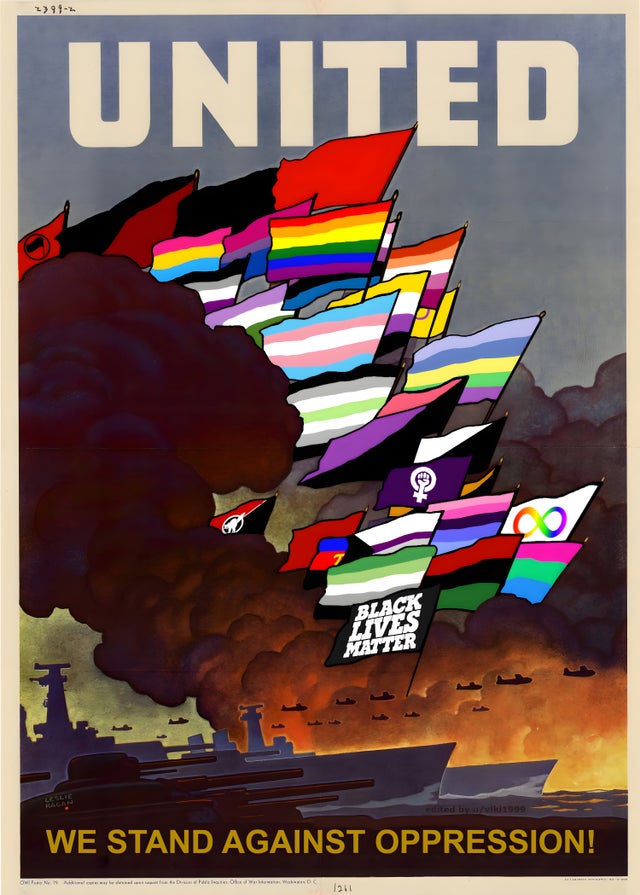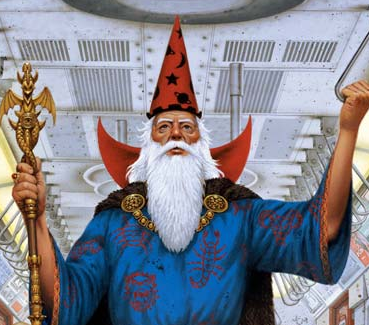Once you learn how to understand and apply historical materialism and break out of capitalist canards like the myth of barter, it becomes much easier to come up with the things that make societies feel evolving, nuanced, and alive: internal struggles, subcultures and countercultures, political movements, economic bases, social mores and customs. That, plus having a variety of real-world examples to draw from to avoid falling into the trap of capitalist realism.
Lmao on the other hand it has made my lib DMs worldbuilding seem pretty barren. He had a sport of company town with no formal government, but the police still existed. We asked who employed the police, and he said the government. We asked him what government, and he said “the important people pay them.” So far so good if you wanna make a crypto fascist Dystopia, but he didnt. He wanted it to be kind of a fantasy company town with a repressed working class, but he also wanted to have cool wacky frontier type of government that were the good guys, so they couldn’t be repressive. So he imported social and material conditions of the time period around Battle of Blair mountain, but sort of took everything in our modern society for granted. Police, the law, who makes it, why we follow it, why the cops uphold it, that kind of stuff.
We asked him “why does everyone else go along with the police being around?” And he said “its the law” and we asked “what law?” And he said “you know, the law” and we said “no we don’t know, what law? Like the police say they are the police, but on what authority? What is the social contract that makes them be accepted by society if it is not just brutal repression?” And he went “well it’s not repression unless you break the law.”
And we said “BUT WHO MAKES THE LAW AND WHY WOULD WE GO ALONG WITH IT IF WE HAVENT ELECTED THE PEOPLE WHO MAKE THE LAW OR GOTTEN THE SHIT BEATEN OUT OF US FOR NOT SUBJUGATING OURSELVES?WHY DO PEOPLE ACCEPT THAT THEIR FRIENDS GET KIDNAPPED AND PUT INTO LOCKED ROOMS FOR BREAKING AN AGREEMENT THEY HAVE NEVER ACCEPTED?” and he said “oh they’re elected!” And we said “SO THERE IS A GOVERNMENT?” and he said “no. The people in charge make the law” and we went “but that’s what a government is!” And he went “but nobody pays taxes” and we asked “but then how are the cops being paid?” And he said “the important people pay them” and we said “why do they do this?” And he said “its the law, and also they control the police” and we said “so they’re the government” and he said “no not at all, they don’t make the laws and also they don’t actually control the police” and we were just like
It was like he was pretty much the entire way at describing a fascist police state, but he kept insisting it wasn’t, it was just like now… It was making us crazy because he couldn’t see it himself. Like it wasn’t a joke or some sort of commentary, it was just the most “well it’s a town so it has police. They uphold the law, which people obey, and if they don’t they go to jail, which is how the law works”

He kept trying to insist that the cops ruled by consent, but they had their wages paid for by the corporations, the laws were made by the corporations, people lived in absolute squalor, but kept moving to the town, despite there being nothing (materially or socially) barring them from moving to other towns less than 5 days travel away, or fighting back (despite having established that the working class people were more numerous, had access to FIREARMS in a fantasy setting) They had every reason and means to do an uprising, yet somehow didn’t. It was all just aesthetics. He’s good at aesthetics though, but yeesh guy if you’re gonna do political stuff read a book or two please.
tl;dr my DM assumed the existence of police was a natural occuring phenomen. My DM also assumed “the law” to be some sort of natural occuring phenomenon.
I used to listen to the Ricky Gervais Show and Karl Pilkington (same guy from An Idiot Abroad) would sometimes share his ideas for inventions but he never thought out how they would actually work, which of course made Ricky and Steve crack up.
In one episode he presented an idea for “a watch that counted down your life”, i.e. if you were going to die in 3 days it would read “3 days” on the watch. When pressed to explain how it would actually work, he kept answering “just pop it on your wrist”
Anyway I think about that segment a lot when I talk to liberals about their conception of the political economy.
If he said how it worked, people could critique it.
I found a YouTube link in your comment. Here are links to the same video on alternative frontends that protect your privacy:
Haha nice, these days when my lib friends ask me what am I doing outside work, I tell them I’m studying worldbuilding irl. They’re like thats awesome, give me some recommendations and I send them texts on Mao’s people’s communes lmao!


Can you send me those texts?
Here yo go: https://www.marxists.org/archive/cliff/works/1960/xx/peoplescommunes.html https://www.marxists.org/reference/archive/mao/selected-works/volume-9/mswv9_02.htm
There are some other academic articles but they’re paywalled. I’ll find and link them here later.
Samesies. I’m not so great on reading the big books of theory but I’ve passively absorbed and put together enough bits of theory that the world just makes sense to me in a way it didn’t before, and I’m thinking about the sources of conflict and factions that might arise from them. Eastern jungle continent being soft-colonized by the recovering war-ravaged west? Northern settled lizardfolk kingdoms are all too glad to let the western corporations and privateers slaughter the southern nomadic tribes clearing land for rapid cash-crop farming with time acceleration. They get to expand and secure more territory and make more money selling spices and their superior alchemical compounds to the traders who enjoy the protection of the Peacekeepers (probably need to change that name) who patrol the edges of the protectorate against piracy but simply don’t have the resources to go out protecting those poor tribals against the outlaws who leave the protectorate against the rules of the charter! Also yes they’re stocking up on alchemical weapons that technically do not violate the ban on non-lightning weapons since they’re not elvencraft in origin, and choking gas is just too damn useful of a tool to leave by the wayside. There was a riot in that dwarven factory town last week, nipped that shit in the bud. There’s no nobles anymore, no need for revolutions. Also have you tried this coffee stuff? Or chocolate? Don’t know why the tribals are just sitting on that shit and spend all day hunting. Don’t they know they could make tons of money fast-farming it themselves? Their fault for dying tbh
Yeah, this is what I’m talking about. These are all the ingredients for a story that’s better than 99% of the fantasy drivel that manages to get published.
I’ve got an idea kicking around in my head for a take on sirens: their don’t lure sailors to their doom with their song, they just have really nice singing voices. But their villages tend to be built in shallows in the way of shipping lanes used by trade companies, and gosh, wouldn’t it be convenient if we had a reasonable-sounding justification to clear them out?
I’ve been thinking about this a lot recently, too. In reflecting on some of the D&D campaigns I’ve run, I realize how much of capitalist life is reflected within them. I’d be interested in hearing how you apply Historical Materialist thinking to world building.
One thing I’ve always wanted to avoid is making other ancestral societies simply be “Human Elves”. Meaning, Elves have all the same economic and political norms that a Human society has. It simply doesn’t make sense to me that a society of people, objectively created by gods, who live for over 750 years (or forever in some settings), would have a gold-based market economy and notions about private property. The same basically goes for Dwarves as well.
If labor is the base of all societies, and the people in some of these societies can live for hundreds of years, what kind of impact does that have on the superstructure of their societies?
Yeah, it’s a lot of fun to think about how people being extremely long-lived or immortal would shape a society. Just off the top of my head, you can’t really disentangle human political development from the idea of inheritance, whether that be inheritance of property or the countless societies that have had some form of hereditary rule.
I’d be interested in hearing how you apply Historical Materialist thinking to world building.
Thanks for asking! To give one example, my most recent project has been a bronze-age society of sapient gryphons (who have the talon dexterity to use tools and do other human things). Having just come off reading David Graeber’s Debt: The First 5000 Years, I remembered a section describing how currencies like metal coins in many cases ended up being marked and used as forms of credit ledgers, and reading about how during food shortages, ancient states would often do some form of grain distribution to stave off the worst of famine.
From these, I came up with the idea of a sort of welfare system where, during times of famine, the gryphon society’s state issues monthly tin coins, each entitling a citizen to a share of millet from the palace granaries. The first three times the coin is redeemed, it’s punched, and the fourth and final time, the coin itself is turned in, to be melted down and recast for next month’s distribution. In effect, the coins act as a sort of bronze age ration cards. Tin was chosen for its low melting point (handy to use for things you’re repeatedly recasting) and because I’d earlier established that the society was known for its expert bronzeworking, implying that it had access to appreciable tin deposits.
To this day my favourite instances of world building are Disco Elysium and Elden Ring.
Not much to say about Disco Elysium. It’s writers are Marxist.
While Elden Ring creator is most likely not a Marxist, his work (Dark Souls series, etc.) grapple with concept of epochs rising, waning and coming to an end. A common theme is that there is an ever pervading atmosphere of stagnation (in the japanese sense), decay, rot, and major actors of the world are either trying to keep the flimsy scaffolding standing while others are trying to being the current age to an end so that a new one may begin. It stands in contrast to how liberal media and people seem to not know that history has gone on for longer than since yesterday.
What are some of your favorite books?
- Debt: The First 5000 Years, which has a good deal of information about the economies of ancient societies, including their economic models and the factors leading to things like the rise and decline of currencies.
- The Origins Of The Modern World, which goes into great detail about the staggering violence and brutality capitalism inflicted in building the wealth of Europe, and demonstrates that capitalism is and always has been a state enterprise.
- Caliban And The Witch, a feminist Marxist work that details the material circumstances that drove witch hunts and suppression of women’s rights in early modern Europe. Disclaimer: I haven’t read very far into this one yet, but what I’ve seen is good.
- The State And Revolution - where Lenin details his model of the state as a means by which one class imposes its will on another.
- Imperialism: The Highest Stage of Capitalism - Another Lenin work, in which he describes the processes by which capitalism leads to concentration in production, which in turn leads to the dominance of finance capital, which in turn engenders imperialism.
- Podcast rather than a book, but Hell On Earth is a series about the Thirty Years War that highlights the economic power struggle of what is often seen as a strictly religious conflict, co-hosted by our own large adult son.

Cheers
Those are really solid and I could see them used for world building! Awesome
Seconding this request. I have enough knowledge of theory to argue with liberals, but not nearly enough to do what I actually want to do, which is portray societies and cultures while worldbuilding in an interesting way. I love writing, but all my plots usually just become yet another fantasy (or sci-fi) communist revolution story lol
Reading Communist theory made me my academic advisor’s darling star student. It was so fucking funny.
Same here, but I also got disillusioned with the online communities and fantasy/scifi literature. I feel like there’s a lot of focus on “hard” worldbuilding which is to say magic systems, tectonic plates, and deterministic (and somewhat racist) theories.
But not enough of the social aspect like language and culture which linguistics/conlanging and anthropology covers. Dialectical materialism then ties them together, the physical and the social. It’s the final stage of worldbuilding quality you could say
But a lot of worldbuilders hate on the above because it’s too much work apparently. Though I find that weird when they are still willing to draw detailed maps and calculate tectonic plates movement idk.
I remember watching Brandon Sanderson’s lectures on writing when he said to ignore language. I vividly remember my disillusionment starting then.
Someone who ignores details of the real world to create a fictional world but still calls it as detailed as the real world is very suspicious to me.
I remember watching Brandon Sanderson’s lectures on writing when he said to ignore language.
That’s frankly silly of him. At the same time, though, building an entire fictional world is a massive enough task that I think it makes sense to focus on what is needed to make the story work. My personal philosophy is to focus on the parts of the worldbuilding that you enjoy. Language isn’t a particular interest of mine, but there are a lot of people who find it fascinating, and they will appreciate stories with well-developed fictional languages - just look at how many people have learned Tolkien’s Elvish, or Klingon. Conversely, if someone really wants to muck about with plate tectonics and meteorology, then I say more power to them, and I wish them the best in finding likeminded people. I myself lean most heavily into worldbuilding history, politics, economics, and engineering, but I understand that those things aren’t everyone’s bag.
Yeah you’re right. I guess I mean outright ignoring one part is worse than not focusing on it. For example with language, you could just say there is a language but not actually flesh it out and translate things, or even just have a babel fish universal translator contrivance.
Although I was also thinking more like the Bangladeshi independence struggle, which was rooted in linguistic identity. It’s one thing to never explain why the aliens in the MCU all know English, but entirely ignoring the role of language in human history seems flawed.
Especially since I consider language and culture in general as important to species-essence or human nature as much the ability to perform labor, so it should be present in the dialectic of history








